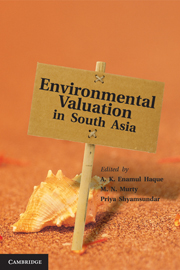Book contents
- Frontmatter
- Contents
- List of Figures
- List of Tables
- List of Appendices
- List of Contributors
- Preface
- Chapter 1 Introduction
- Chapter 2 Environmental Valuation: A Review of Methods
- Chapter 3 Valuing the Environment as a Production Input
- Chapter 4 Should Shrimp Farmers Pay Paddy Farmers?: The Challenges of Examining Salinization Externalities in South India
- Chapter 5 Evaluating Gains from De-Eutrophication of the Dutch Canal in Sri Lanka
- Chapter 6 Pesticide Productivity and Vegetable Farming in Nepal
- Chapter 7 Forests, Hydrological Services, and Agricultural Income: A Case Study from the Western Ghats of India
- Chapter 8 Can Mangroves Minimize Property Loss during Big Storms?: An Analysis of House Damages due to the Super Cyclone in Orissa
- Chapter 9 Valuation of Recreational Amenities from Environmental Resources: The Case of Two National Parks in Northern Pakistan
- Chapter 10 Valuing the Land of Tigers: What Indian Visitors Reveal
- Chapter 11 Estimating Welfare Losses from Urban Air Pollution using Panel Data from Household Health Diaries
- Chapter 12 Children in the Slums of Dhaka: Diarrhoea Prevalence and its Implications
- Chapter 13 Red Wells, Green Wells and the Costs of Arsenic Contamination in Bangladesh
- Chapter 14 Air Quality and Cement Production: Examining the Implications of Point Source Pollution in Sri Lanka
- Chapter 15 Revisiting the Need for Improved Stoves: Estimating Health, Time and Carbon Benefits
- Chapter 16 Benefits from Reduced Air Pollution in Delhi and Kolkata: A Hedonic Property Price Approach
- Chapter 17 The Value of Statistical Life
- Chapter 18 An Assessment of Demand for Improved Household Water Supply in Southwest Sri Lanka
- Index
Chapter 6 - Pesticide Productivity and Vegetable Farming in Nepal
Published online by Cambridge University Press: 05 November 2012
- Frontmatter
- Contents
- List of Figures
- List of Tables
- List of Appendices
- List of Contributors
- Preface
- Chapter 1 Introduction
- Chapter 2 Environmental Valuation: A Review of Methods
- Chapter 3 Valuing the Environment as a Production Input
- Chapter 4 Should Shrimp Farmers Pay Paddy Farmers?: The Challenges of Examining Salinization Externalities in South India
- Chapter 5 Evaluating Gains from De-Eutrophication of the Dutch Canal in Sri Lanka
- Chapter 6 Pesticide Productivity and Vegetable Farming in Nepal
- Chapter 7 Forests, Hydrological Services, and Agricultural Income: A Case Study from the Western Ghats of India
- Chapter 8 Can Mangroves Minimize Property Loss during Big Storms?: An Analysis of House Damages due to the Super Cyclone in Orissa
- Chapter 9 Valuation of Recreational Amenities from Environmental Resources: The Case of Two National Parks in Northern Pakistan
- Chapter 10 Valuing the Land of Tigers: What Indian Visitors Reveal
- Chapter 11 Estimating Welfare Losses from Urban Air Pollution using Panel Data from Household Health Diaries
- Chapter 12 Children in the Slums of Dhaka: Diarrhoea Prevalence and its Implications
- Chapter 13 Red Wells, Green Wells and the Costs of Arsenic Contamination in Bangladesh
- Chapter 14 Air Quality and Cement Production: Examining the Implications of Point Source Pollution in Sri Lanka
- Chapter 15 Revisiting the Need for Improved Stoves: Estimating Health, Time and Carbon Benefits
- Chapter 16 Benefits from Reduced Air Pollution in Delhi and Kolkata: A Hedonic Property Price Approach
- Chapter 17 The Value of Statistical Life
- Chapter 18 An Assessment of Demand for Improved Household Water Supply in Southwest Sri Lanka
- Index
Summary
Introduction
Vegetable producers around the world heavily rely on the use of chemical pesticides to ensure pest control. Although pesticides do not directly contribute to agricultural yields, there is evidence to suggest that intensive use of pesticides has significantly increased agricultural production (Brethour and Weersink, 2001). However, pesticide use also poses risks to human health and the environment (Travisi et al., 2006). Thus, it is important to examine the trade-offs associated with the costs and benefits of pesticides under different empirical contexts.
Several studies show that there are significant social and environmental costs to pesticide use (Ajayi, 2000; Antle and Pingali, 1994; Antle and Capalbo, 1994, Rola and Pingali, 1993). Some of these studies (Rola and Pingali, 1993; Rahman, 2002) also suggest that indiscriminate pesticide use can lead to larger pest-related yield losses relative to situations where pesticides are not applied. In the absence of pest attacks, pesticide use only results in extra costs and no real benefits. Nevertheless, in the hope of combating the problem of pests, farmers frequently apply high doses and disproportionate combinations of several pesticides, contributing to a pesticide treadmill in certain areas (Shetty, 2003). Farmers in developing countries in particular continue to use pesticides at increasing rates (WRI, 1998).
Pesticides do not enhance productivity directly like other standard factors of production such as land, labour and capital. Rather, they help farmers compete against pests that would otherwise reduce agricultural output.
- Type
- Chapter
- Information
- Environmental Valuation in South Asia , pp. 115 - 140Publisher: Cambridge University PressPrint publication year: 2011



